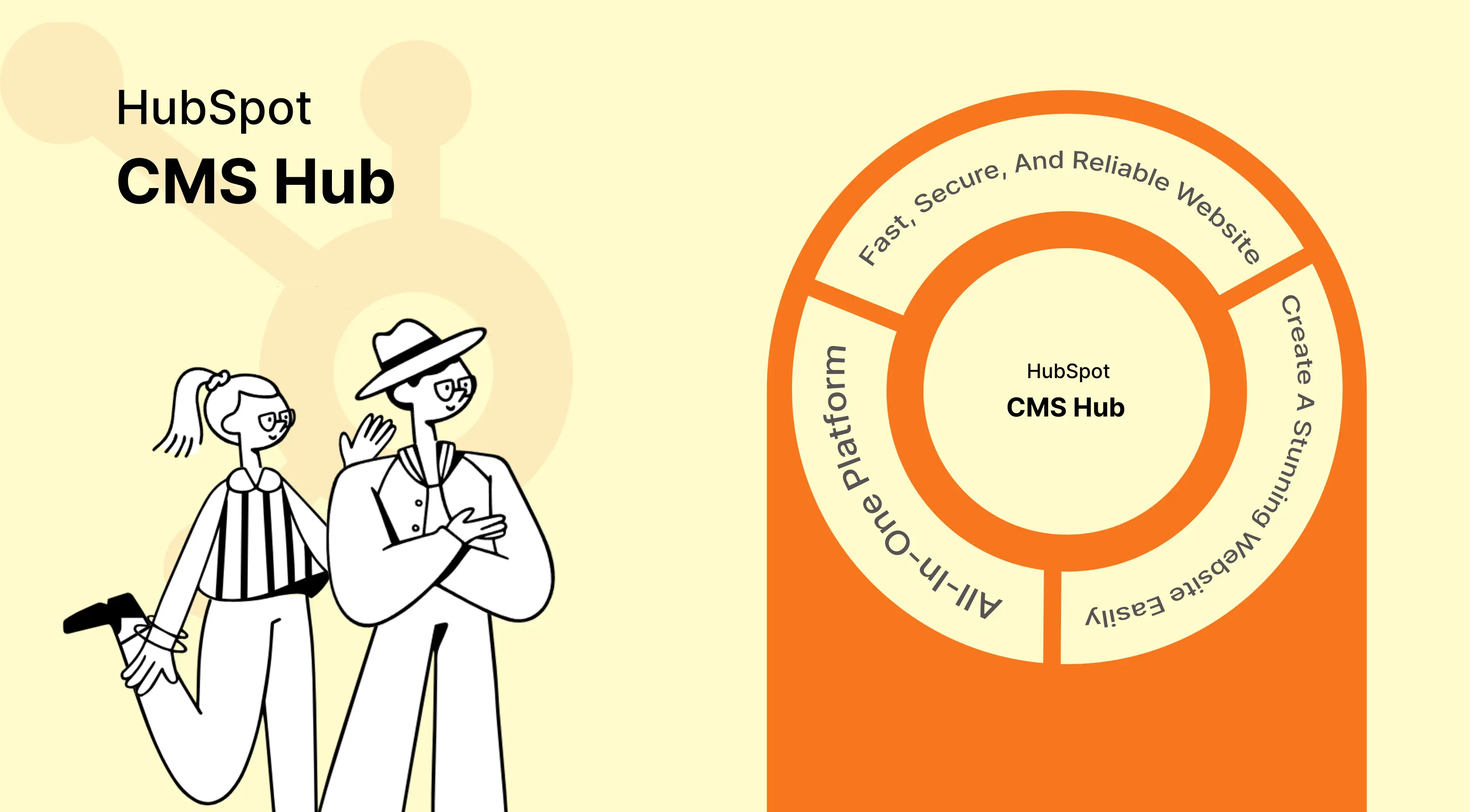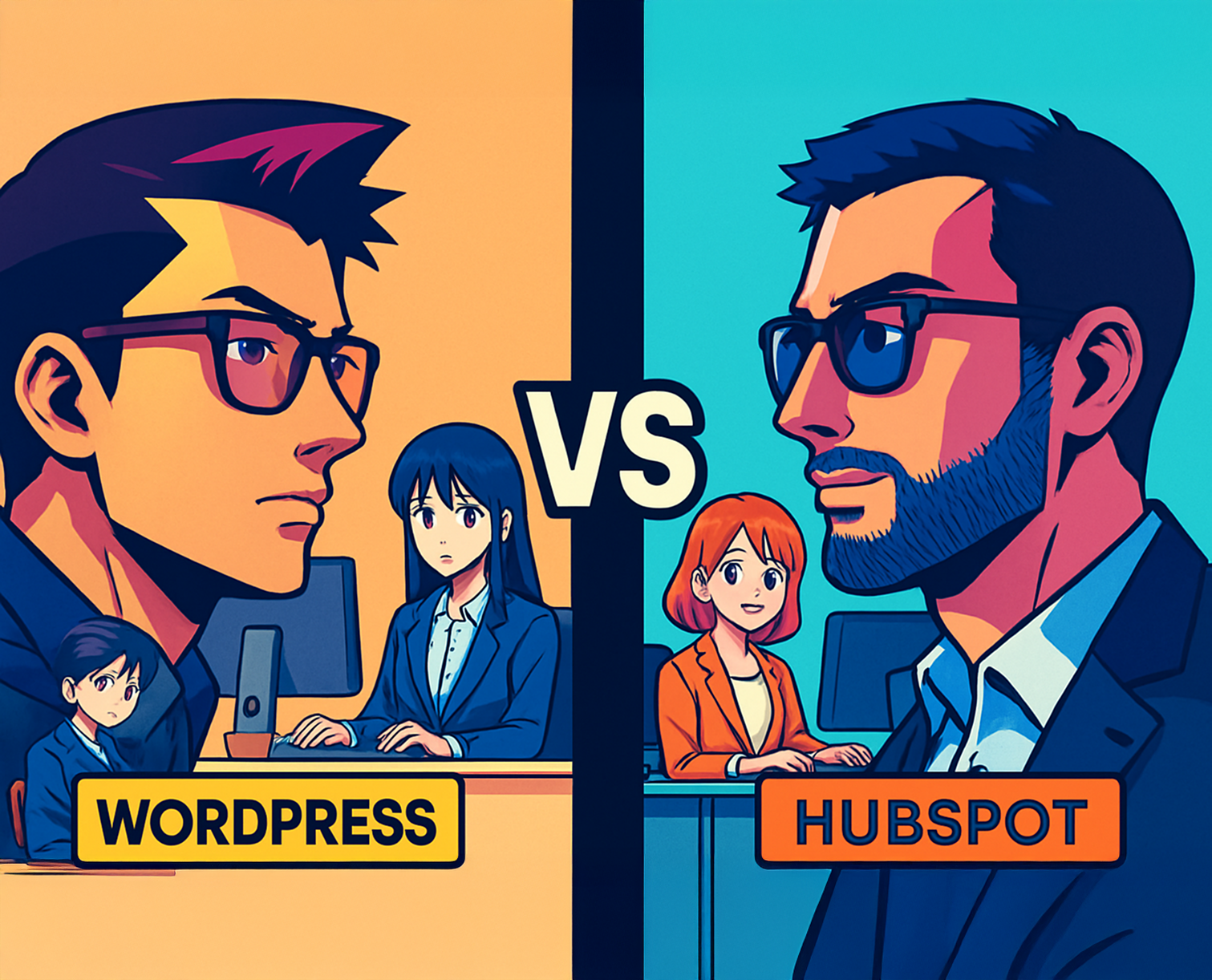Listen to the Blog
If you’re running a growing business, your website is more than a digital brochure. It’s your growth engine. It should attract visitors, capture leads, and fuel your sales pipeline.
The tricky part? Picking the right Content Management System (CMS). For most businesses, the choice often comes down to WordPress vs HubSpot CMS.
At first glance, WordPress looks like the cheaper, more flexible option. But when you’re scaling, the hidden costs, security issues, and developer dependency start to weigh you down. HubSpot CMS, on the other hand, takes a different approach, with built-in tools, speed, and a growth-first mindset.
So which one actually helps your business grow faster? Let’s break it down.
WordPress: Popular, Powerful… but Patchy
WordPress powers over 40% of websites worldwide. It’s open-source, flexible, and has thousands of plugins. That’s why so many businesses start here.
But if you’ve ever had your website crash after a plugin update, or waited three days for a developer to fix a “simple” layout issue, you already know the pain points.
WordPress Pros
- Massive library of free and paid themes:
Whether you want a simple blog or a complex e-commerce store, there’s a theme for almost every niche and design style. - Flexible for custom development:
With its open-source framework, developers can create almost anything, from custom plugins to full-scale applications. - Low entry cost:
WordPress itself is free, and with budget hosting, you can get a website online quickly without a significant upfront investment.
Cons of WordPress for Growing Businesses
- Plugin overload:
Need SEO, analytics, or security? Each requires a separate plugin, which increases risk and slows down performance. - Hosting dependency:
You must manage your own hosting, backups, and server performance. - Security concerns:
As the most widely used CMS, WordPress is a frequent target for hackers. - Developer reliance:
Even minor updates often need technical support. - Hidden costs:
Hosting, premium plugins, and ongoing developer fees add up over time.
HubSpot CMS: Built for Growth from Day One
HubSpot CMS flips the script. Instead of patching features together with plugins, it’s an all-in-one platform designed for marketing and sales teams who want speed, security, and scalability.
Imagine this: you set up a new landing page in minutes, with leads automatically flowing into your CRM. Meanwhile, your site remains secure without you needing to worry about updates. That’s HubSpot CMS working for you.
Pros of HubSpot CMS
- All-in-one platform:
SEO tools, analytics, A/B testing, and forms are already built in, so you don’t waste time managing plugins. - Hosting + global CDN included:
Your website loads quickly from anywhere in the world without paying extra for third-party hosting. - Enterprise-grade security:
Automatic SSL, 24/7 monitoring, and built-in firewalls mean your site is protected without manual updates. - Marketer-friendly editing:
Drag-and-drop page building empowers your team to make updates instantly without waiting on developers. - CRM integration:
Every form submission connects directly to HubSpot CRM, helping you track, nurture, and convert leads seamlessly. - Scalability:
HubSpot CMS grows with you, from startup landing pages to enterprise websites with advanced personalisation.
Cons of HubSpot CMS
- Higher starting cost:
Compared to basic WordPress hosting, HubSpot CMS may feel more expensive upfront. But it often saves money long-term by eliminating plugins, hosting, and maintenance costs. - More miniature theme marketplace:
While HubSpot offers templates and custom modules, it doesn’t have the same massive library as WordPress. However, customisation is still possible through HubSpot developers or marketplace assets.
WordPress vs HubSpot CMS: Updated Comparison Table
| Feature | WordPress | HubSpot CMS |
| Setup | Free to install, but you need to arrange hosting, SSL, and backups yourself. | Fully hosted with built-in CDN, SSL, and backups, ready to go from day one. |
| Plugins & Features | Relies heavily on plugins for SEO, analytics, security, and forms. More plugins = higher risk and slower performance. |
All-in-one platform with SEO tools, analytics, A/B testing, forms, and security included - no plugin overload. |
| Security | Requires constant plugin and core updates to stay secure. Vulnerable if not maintained. | Enterprise-grade security, including SSL, firewall, and monitoring, is automatically included. |
| Hosting & Performance | Hosting costs vary, and performance depends on your hosting provider and plugin setup. | Hosting + global CDN included, ensuring fast performance worldwide. |
| Ease of Use | Non-technical users often struggle, and many updates require developer support. | Drag-and-drop editor allows marketers to create and update pages without dev help. |
| Costs | Appears cheap at first, but hidden costs pile up (plugins, hosting, developer fees). | Transparent pricing with no surprise plugin or hosting fees. |
| CRM Integration | Requires third-party plugins or custom development. | Native HubSpot CRM integration ensures each lead automatically enters your pipeline. |
Best Practices When Choosing a CMS
No matter which platform you choose, here are some best practices to keep in mind:
- Prioritise speed & performance:
Slow sites = lost leads. - Integrate marketing & sales:
A CMS with CRM built in saves hours. - Reduce plugin reliance:
No plugins = less risk and maintenance. - Don’t ignore security:
SSL, backups, and firewall protection included. - Empower your team:
Choose a CMS that marketers can manage without devs. - Think ahead:
Pick a CMS that scales as your business grows.
Which CMS Wins for Growing Businesses?
If you need the cheapest way to get online, WordPress can do the job.
But if you’re scaling and want a CMS that:
- Generates leads
- Supports campaigns without delays
- Stays fast and secure automatically
- Connects to your sales pipeline
…then HubSpot CMS is the clear winner.




_%20The%20Hidden%20Costs%20Explained.png)




%201.png?width=1016&height=912&name=image%20(54)%201.png)